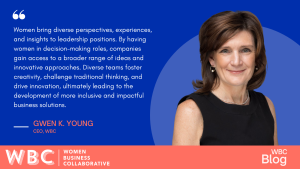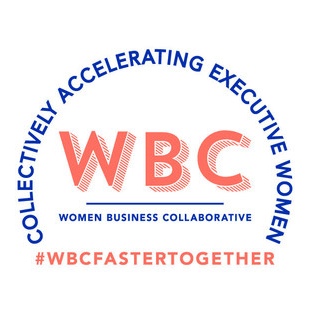
Moving into spring of 2024, we are seeing a shift in how we talk about the workplace and leadership. The headlines are focused on “building an engaged workforce” “inclusivity” and “authentic leadership.” They are also infused with the role of corporate America in policy and how corporate and public sector policy are interwoven.
Critical to this discussion is ensuring diverse leadership across business from the boardroom and C-Suite to the workforce. When corporations build out diverse leadership across the organization, they create a culture where the multiple voices bringing a rich infusion of ideas to the workplace, and thus greater innovation and higher profits. A workplace culture that promotes growth and achievements of women as well as men, and of people of color, not just the promotion of white men—is a culture that inspires its employees and drives profits and financial gains for companies.
Research by Deloitte suggests companies with an inclusive culture are six times more likely to be innovative. By staying ahead of changes, they are twice as likely to hit or better financial targets. This is a powerful finding, one that has been proven by other studies as well. Corporations that embrace an inclusive culture find that inclusion is good for business practices and good for the bottom line.
So, let’s take this argument one step further. What does it mean when there is a woman who is head of the corporate board? What does it mean when a woman is CEO and what is the interplay between women’s leadership on the Board and as the CEO? Research done by WBC and our partner 50/50 Women on Boards’ Annual Diversity Index Study suggests that there is indeed a link between women at the top and greater diversity in the boardroom: Using data provided by Equilar, the 50/50 Women on Boards Gender Diversity Index™ shows that boards are more diverse when women hold the CEO, Board Chair, or Nominating Committee Chair positions. When all three positions are held by women, the percentage of women on those boards is 48.6%, nearing gender balance.
Here is the value-add. Women bring diverse perspectives, experiences, and insights to leadership positions. By having women in decision-making roles, companies gain access to a broader range of ideas and innovative approaches. Diverse teams foster creativity, challenge traditional thinking, and drive innovation, ultimately leading to the development of more inclusive and impactful business solutions.
Diversity in leadership teams has been positively correlated with increased positive financial results: businesses with the highest gender diversity are 48% more likely to achieve better results than those with the least gender diversity.
Mary Barra, the indomitable CEO of General Motors, exemplifies a leadership style that puts inclusiveness at the core. She rose through the ranks at GM, starting at 18 when working on the factory floor inspecting bumpers and hoods of cars. She consistently demonstrates respect for what she considers the company’s most valuable asset—the people. GM endured a spectacular crisis during her first year as CEO that forced her to recall 30 million vehicles because of a failed ignition switch, and rather than bury that story and soldier on; she has kept it front and center, urging humility and a willingness to speak out if someone—anyone—sees something that isn’t working right. The result is that this approach avoided bankruptcy.
Recently, Barra outlined her plan to make GM the most inclusive company in the world, saying employees who feel they can be themselves at work will do their best work. She created the Inclusion Advisory Board. Barra has transformed the culture and continues to change the way GM operates internally. She hosts town halls to seek input from the workforce, fosters an environment of open communication, and holds meetings to discuss rather than delegate and disseminate. Her leadership style exemplifies inclusion, and these changes have been integral to shifting a culture of repression and intimidation into a corporate culture in which all voices, from the lowest-ranked employee to those in the C-Suite, are heard and valued. General Motors topped Wall Street targets, exceeded its Q1 profit estimates by 2.8%, and rose its shares by 4.4%.
As Barra exemplifies, better representation on corporate boards and in the CEO role bring about change in the corporate culture that drives results. A shift in corporate culture inevitably means that change is afoot. There may be pushback. There may be skepticism from those who feel their security is at risk, but in the end, we know that more women in leadership means greater financial success for the corporations which is ultimately the point. This is why WBC presented Mary Barra with the CEO Excellence in Gender Equity and Diversity Award in 2023. There are ways that companies can promote greater inclusion as outlined in our WBC Women CEO report found here. Change isn’t always comfortable, changing protocols at work can take some time and adjustments. But we know that the efforts are worth it.
Another pioneer to mention is Vernā Myers, Founder & President of The Vernā Myers Company.
Vernā’s groundbreaking work has not only transformed organizations but also inspired change on a global scale. With nearly three decades of experience as an inclusion strategist and cultural innovator, Vernā has been instrumental in dismantling barriers to inclusion and equity across various dimensions of diversity. Her dedication to fostering environments where all individuals feel valued and empowered is truly commendable.
Vernā’s trademarked motto is “Diversity is being invited to the party. Inclusion is being asked to dance.” ®

Join us in Baltimore on Thursday, May 30, 2024, as we acknowledge Vernā Myers’s lifelong achievements and present her with the WBC 2024 Trailblazer in Gender Equity and Diversity Award.
Gwen K. Young
CEO, WBC








